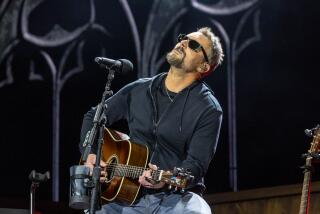A trip that’s never dull
- Share via
THE musical eclecticism that dominated Day 1 of the 29th Playboy Jazz Festival on Saturday continued in Sunday’s program at the Hollywood Bowl, which ran from zydeco and blues to Afro Cuban and smooth jazz.
But there were notable differences. On Saturday, many of the jazz groups, in their efforts to infuse pop elements into their music, were largely eclipsed by the authenticity of performances by international artists (Angelique Kidjo, Issac Delgado) and a blues veteran (Buddy Guy).
Sunday’s program revealed a far more impressive balance, the various genres’ qualities coming together convincingly.
Surprisingly, they did so without falling victim to the festival’s usual impromptu segmentation, in which midafternoon groups face distracted, picnicking and sunbathing listeners, and early-evening performers deal with fans focused on drinking and dining. None of these problems surfaced for a lengthy segment of programming that produced some of the best balanced, most stylistically versatile music of recent memory.
After opening sets by bassist Malcolm-Jamal Warner’s Miles Long ensemble, pianist Taylor Eigsti’s Quartet and the jaunty rhythms of Nathan & the Zydeco Cha Chas, saxophonist Red Holloway, celebrating his 80th birthday and joined for part of his set by singer Kevin Mahogany, paid tribute to the mainstream jazz of the ‘50s and ‘60s, affirming the life-enhancing qualities of jazz as a profession.
The day’s musical universe then expanded dramatically. Bassist Marcus Miller’s startling excursion through John Lennon’s “Come Together,” for example, captured the quirkiness of the original with driving, jazz-based rhythmic emphasis.
Cameroonian bassist Richard Bona combined traditional African melodic phrases with his sweet-toned vocals and crisp instrumental lines. His band -- a virtual U.N. ensemble -- played with an improvisational diversity testifying to the many creative currents flowing into jazz from various parts of the world.
Trumpeter Terence Blanchard’s solid quintet -- featuring the inventive saxophone work of Brice Winston -- stretched into other adventurous areas. Successfully testing an afternoon crowd’s receptivity to music that reached beyond theme and variations, Blanchard performed segments from his “Requiem for Katrina,” based on themes inspired by, and from, his score for Spike Lee’s film “When the Levees Broke.”
The festival’s two remaining highlights reached from the Afro Cuban swing of Arturo Sandoval’s Mambo Mania Big Band to Etta James and her Roots Band. Despite their differences, both impressed with their combination of musical authenticity and subtle connections to jazz. Sandoval’s virtuosity -- on trumpet, piano and timbales -- was applied to a revival of mambo rhythms that brought the crowd into the aisles. James, looking svelte, sang with the passion -- as well as the sardonic wit -- that has characterized her work for half a century. Her performance was a vivid reminder of the essential, ever-continuing connection between jazz and the blues.
The day was further enhanced by the smooth jazz of Norman Brown’s Summer Storm and the amiable vocalizing of singer Dianne Reeves.
More to Read
The biggest entertainment stories
Get our big stories about Hollywood, film, television, music, arts, culture and more right in your inbox as soon as they publish.
You may occasionally receive promotional content from the Los Angeles Times.










